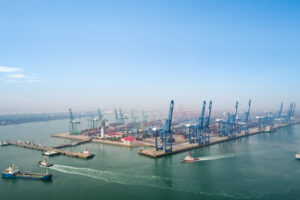KCG Seminar “Decoupling Global Value Chains” by Peter Eppinger on April 16

Global value chains (GVCs) have been quickly developed and extended since the 1990s. GVC growth is often seen as one of the main reasons behind the rapid growth of international trade but it has been slowed down since the financial crisis in 2008 particularly due to the decline in overall economic growth, the rising protectionism and intensifying trade tension as well as the Covid-19 pandemic. The pandemic-determined GVC disruption especially in the first half year of 2020 induced many countries to think about whether moving away from GVCs and relying more on national or regional inputs and value chains may help firms and countries to be better protected from foreign shocks.
Against this background Prof. Dr. Peter Eppinger (University of Tübingen) will give a KCG Lunch-Time Seminar “Decoupling Global Value Chains” this Friday, based on his recent paper co-authored with Prof. Gabriel Felbermayr, Ph.D. (Kiel Institute, KCG and Kiel University), Dr. Oliver Krebs (University of Tübingen) and Prof. Dr. Bohdan Kukharskyy (City University of New York). Their research provides model-based quantifications of both the losses from decoupling itself and its consequences for international shock transmission. It contributes to the related scientific and public debates of whether countries may be better off by decoupling from GVCs or not.
Abstract: The supply chain contagion sparked by the Covid-19 pandemic has brought an important question to the forefront of the policy debate: Can cutting global value chains (GVCs) benefit a country by shielding it from foreign shocks? Using a quantitative trade model we find that shutting down GVCs causes substantial welfare losses in all countries. In this counterfactual world without GVCs, the international repercussions of a Covid-19 shock in China are reduced on average, but magnified in some countries. A unilateral repatriation of all GVCs by the U.S. would reduce national welfare by 1.6% but barely change U.S. exposure to a foreign shock. More generally, we find across a wide range of scenarios that the reduction in shock exposure due to decoupling does not compensate the direct welfare costs.
The seminar will take place via ZOOM at 12:00-13:00 on April 16, 2021 (Friday). More information about the seminar and the web access can be found here.



 KCG Projects
KCG Projects


